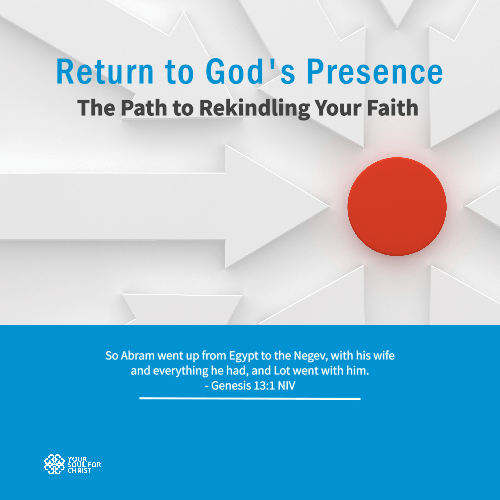So Abram went up from Egypt to the Negev, with his wife and everything he had, and Lot went with him.
Genesis 13:1 NIV
Abram’s journey back to Bethel is a powerful example of the need to return to God’s presence after seasons of missteps and distractions. After leaving Canaan during a famine and experiencing spiritual disconnection in Egypt, Abram’s decision to return to the altar he had built earlier symbolised a renewal of his faith and commitment to God. This story illustrates the importance of recognising when we’ve drifted and taking deliberate steps to restore our connection with God.
Abram initially left Canaan for Egypt because of a famine, but the famine was temporary and not catastrophic. Interestingly, the people of Canaan, many without a relationship with God, endured the famine without leaving. This highlights that Abram’s decision to go to Egypt was likely unnecessary and driven by human reasoning rather than divine guidance.
While in Egypt, Abram prioritised his safety and comfort over his relationship with God, leading to spiritual disconnection. There is no record of him building altars or calling on God’s name during this time. His focus on material gain further distanced him from God’s purpose.
Ironically, it was Pharaoh—a pagan king—who forced Abram to return to God’s presence. Pharaoh’s rebuke and dismissal acted as a divine wake-up call, reminding Abram where he truly belonged.
Abram’s journey back to Bethel was not direct. He wandered from place to place, possibly seeking alternative settlements. This wandering reflects hesitation and a lack of clear intention. However, God’s grace guided him, preventing him from settling elsewhere until he reached the altar at Bethel.
Abram’s return to God’s presence was marked by renewed worship and surrender. Unlike his father, Terah, who left Ur with a clear destination, Abram’s return from Egypt seemed less deliberate. Yet, this journey underscores the power of divine intervention in restoring us to the place of spiritual alignment.
Abram’s story highlights several important lessons about the need to return to God’s presence:
- Material Wealth Cannot Replace Spiritual Vitality: Abram left Egypt wealthier than when he arrived, but his relationship with God suffered. True fulfillment comes from walking in obedience to God.
- God’s Grace in Our Wandering: Even when we lack clarity, God’s grace directs us back to Him. Abram’s wandering was guided by divine intervention, not human resolve.
- Rebuilding the Altar: Returning to Bethel symbolised Abram’s spiritual renewal. It reminds us to revisit the moments of deep connection with God in our own lives, reaffirming our faith.
Abram’s story encourages us to evaluate our spiritual journeys and recognise when we’ve strayed. Like Abram, we may make decisions out of fear or prioritise earthly comforts, but God’s grace always invites us to return to His presence.
In conclusion, Abram’s return to God’s presence teaches us about the power of restoration and the importance of worship. It is a call to realign our hearts with God and seek His guidance in every season of life.
When life’s challenges lead us astray, God’s grace patiently calls us back to Him. Let us return to God’s presence, where we find true peace, purpose, and restoration.
